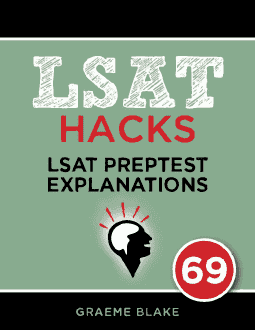This is an explanation for passage 1 of LSAT 69, the June 2013 LSAT. This passage is about Booker T. Whatley’s plan to help small farms avoid debt and bankruptcy.
This section has paragraph summaries and an analysis of the passage, links to the explanations for the questions are below.
Paragraph Summaries
- Whatley has new guidelines to help small farms thrive despite mechanized production.
- Farms should grow at least ten crops, and grow them directly for consumers (CMCs). Farms shouldn’t use chemicals if clients object.
- Pick your own farming will let farms save on distribution costs while selling for fairly high prices.
- Farms should be near cities, so customers can travel to the farm.
Analysis
This is a reasonable plan. Though it’s odd that the LSAC specified that Whatley is African-American.
It’s of course very common for the LSAC to specify that someone mentioned in a passage is a minority. But usually, that’s because their ethnicity is relevant to the topic of the passage. Here, the fact that Whatley is African-American has nothing to do with farming or his recommendations. It feels like tokenism to point out his race.
This passage has a lot of details and the questions ask about them. You don’t need to memorize all the details upfront, but you should have a rough idea where they are.
In other words, you should know the details well enough that a question can jog your memory when it refers to one.
Whatley’s advice is to skip the middleman, offering lower costs for the farmer and lower prices for the consumer.
Normally, a farmer would have to pay workers to pick crops, and have employees drive them to stores. With this plan, the consumer will pick the crops and then drive them back to their house. What the consumer gets:
- The fun of picking crops
- Lower prices
- Exactly the food they ask for
- The ability to ask for no chemicals
What the farmer gets:
- Year round money
- Savings on transport, labour
- Crop diversity
You should be familiar with these points before starting the passage. There are a few other relevant details, but these are the main ones. To get familiar with details, you should do two things:
- Try to organize paragraphs by theme, like I did in the summaries.
- Skim the passage before starting, after you read it. This will let you see the details twice, and they’ll stick in your memory much better.


Being African American.. I actually thought this was strange too when it was mentioned and although it lingered in my mind for a while I quickly forgot it. I think it was mentioned to throw off minorities (particularly Black students). Not to mention the obvious undertones of associating agriculture and being Black has on the psyche of a Black test taker.
I doubt it was malice on their part. The LSAC has all kinds of patterns designed to throw off test takers. But this is the only example I’ve seen of a token mention of ethnicity where it wasn’t relevant to the content.
I think LSAC has a quota for content that mentions underrepresented groups. Most of the time it’s relevant to the subject, but this looks like it was just a somewhat sloppy attempt to meet the quota.
As an aside, Walkley seems he was an interesting guy: http://en.wikipedia.org/wiki/Booker_T._Whatley
I also found it strange that Whatley was specified as being an African American, and am glad you mentioned that. While reading the passage I found this inclusion distracting! I kept thinking why that was even important to mention? Perhaps LSAC took this passage from a piece or book that focused on African Americans in particular? Still, it had absolutely no relevance to the passage!
>Perhaps LSAC took this passage from a piece or book that focused on African Americans in particular?
Yup. I checked the source, and it came from here: “Booker T. Whatley, How to make $100,000 Farming 25 Acres. ©1987 by the Regenerative Agriculture Association.”
Seems he was a pioneer of sustainable farming: http://en.wikipedia.org/wiki/Booker_T._Whatley
My best guess is that LSAC has some sort of internal quota for “ethnic/underrepresented” content for RC, and this was just a sloppy effort to meet it. The passage would have been better if they just left off ethnicity, as it has no bearing on Whatley’s merits as an agriculturist or the argument.